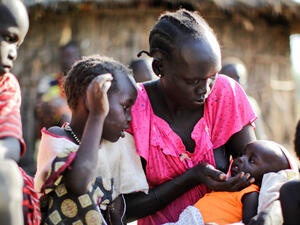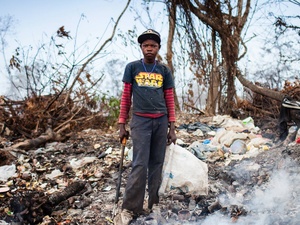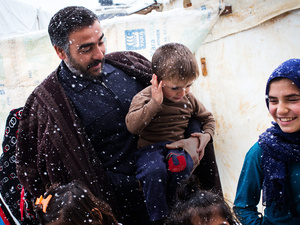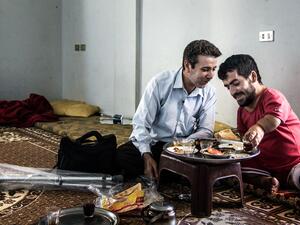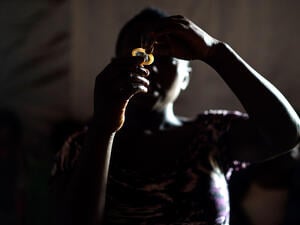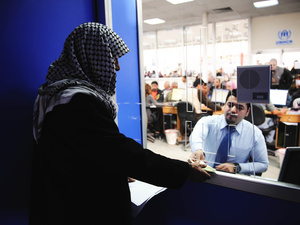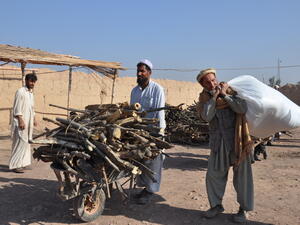Lubbers calls drop in resources for world's poor "shameful"
Lubbers calls drop in resources for world's poor "shameful"
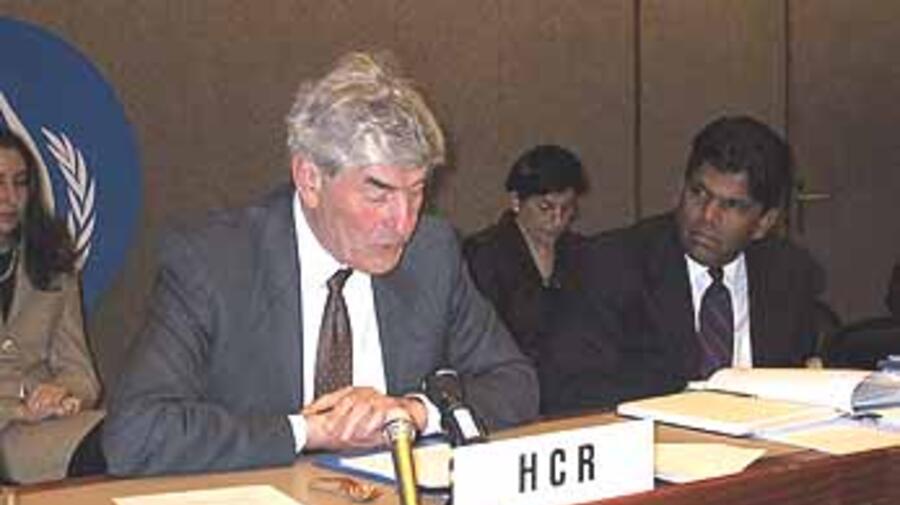
High Commissioner Ruud Lubbers speaking before the U.N. Commission on Human Rights Wednesday.
GENEVA, March 20 (UNHCR) - In his strongest remarks to date on the diminishing resources allotted to the world's poorest people, High Commissioner Ruud Lubbers said Wednesday that the current situation was "shameful" and backed calls for industrialised nations to double their developmental assistance programmes.
Speaking before the 58th annual session of the United Nations Commission on Human Rights, Lubbers also cautioned governments against making "unwarranted linkages" between refugees and terrorism following last September's attacks on the United States.
"It is bad enough that today one-fifth of humanity consumes four-fifths of global income," Lubbers told the Commission. "But on top of this, to allow humanitarian programmes aimed at assisting some of the world's most vulnerable people - refugees - to remain grossly underfunded year after year is shameful."
The High Commissioner, who has made increasing aid to refugees one of his top priorities, endorsed an appeal by World Bank President James Wolfensohn for a doubling of current global development assistance by industrialised countries. "It is worth noting that this would cost a mere 0.2 percent of the income of rich countries," Lubbers said.
Lubbers spoke as the International Conference on Financing for Development began its meetings in Monterrey, Mexico.
"The abominably low levels of assistance being provided by the richest countries to the most marginalized and vulnerable people in the world cannot be allowed to continue," Lubbers said. "I believe that we in the international community must ask ourselves whether or not we are violating the human rights of refugees and other vulnerable people by not providing them with enough assistance for them to live with a minimum of dignity."
He reminded his audience that refugees are frequently accommodated in "remote, economically marginalised and insecure areas" that offer few opportunities for self-sufficiency and force them to become almost totally dependent on humanitarian aid.
He said it would not be possible to live in a world free of crime and terrorism if the fundamental issue of poverty was not addressed. "Injustice, poverty, conflict, ignorance and disease - all these contribute to general instability," he said.
Turning to the issue of the increasing vulnerability of refugees and asylum seekers, he said the September 11 attacks had "added a new dimension to the work of my Office." While fully supporting efforts to identify and punish perpetrators of terrorist crimes who abuse the asylum system, he said linking terrorism and refugees was unwarranted.
"In the current climate, there is a risk that refugees and asylum seekers may become convenient scapegoats and may be unfairly victimised," he said. "We must not allow the global fight against international terrorism to weaken the international protection regime."
The High Commissioner said that the 1951 Refugee Convention had been recognised as a human rights instrument by the Declaration adopted in December by a ministerial-level meeting of the document's signatory states.
"I believe that refugee protection is one of the most fundamental of all human rights, for the minimum right that anyone can ask for is the right to flee and the right to be welcomed somewhere," he said.
While progress has been made in some areas, UNHCR is confronted with new challenges such as recent allegations of sexual exploitation of young refugees in West Africa, Lubbers said. There is "no question" that such exploitation is a very real problem, he said, but the scale is as yet unclear. Still, he added, even one case would be one too many.
"The number of allegations made against specific individuals and organisations by the consultants who carried out the study might be exaggerated," Lubbers said. "The UN Office of Internal Oversight Services (OIOS) is in the process of carrying out an investigation to verify the allegations. But, for me, the point is that action is needed anyway."
He said UNHCR and its partners were implementing a plan of action to enhance the protection of those who are vulnerable to sexual exploitation as well as to provide appropriate care to those who have suffered from it.
"There is absolutely no place in the humanitarian world for those who would prey on the most innocent and vulnerable of the world's refugees - the children," Lubbers said. "There must be zero tolerance."


